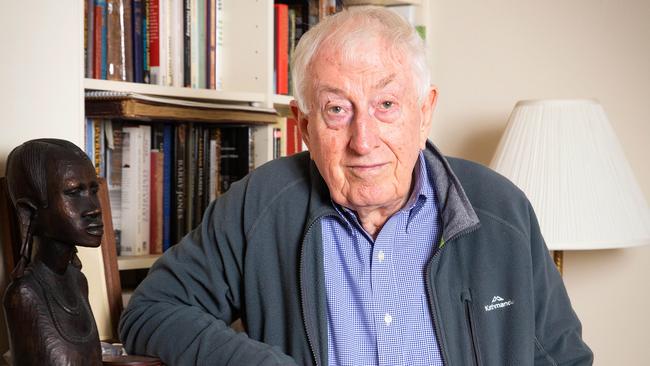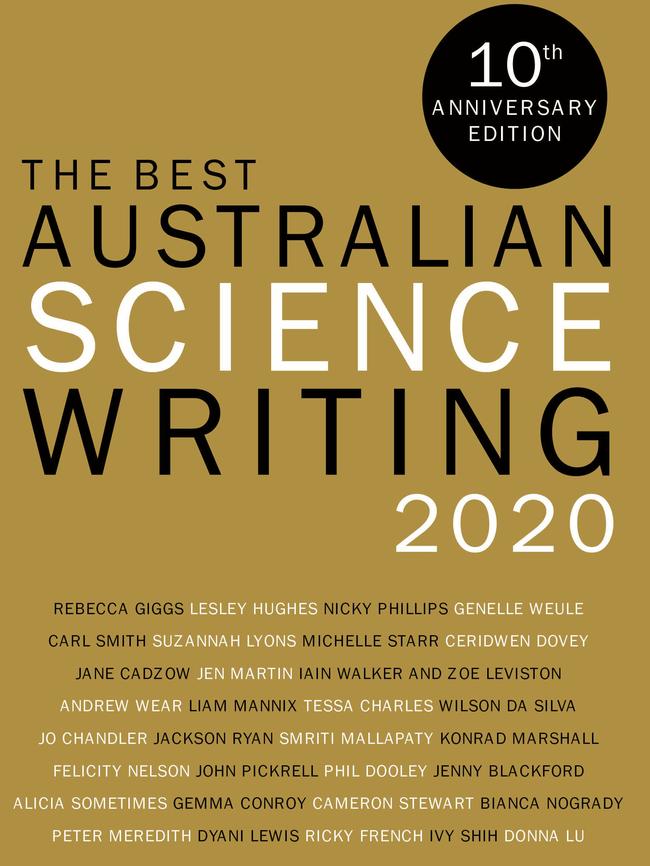Fresh perspectives from the cutting edge of science
So much of the 10th edition of this anthology sounds a quietly positive note.

The 10th edition of this anthology, which to the credit of editor Sara Phillips incorporates a plethora of topics and whose material has been gathered from a wide variety of publications both general and specialist, is a happy event in local publishing. So much of what it contains sounds a quietly positive note on which to end an exceptionally difficult year.
The contents of this book confirm it is genuine advancement in science, rather than doomsaying and hand-wringing, that will provide the only lasting solution to problems besetting this country, from increasingly ferocious bushfires, to the relentless destruction of the natural environment, to over-reliance on fossil fuels, to the effective long-term management of public health crises.
Science does not pretend to have found all of the answers, and indeed in our post-industrial world scientists often are preoccupied with the effort to rectify the enormous problems inadvertently bequeathed by previous generations of their colleagues. The idea of progress in science must be tempered by acknowledgment of the law of unintended consequences.
Human beings have a unique capacity for making catastrophic mistakes and recovering from them, or at least that has been the story so far. Even in the seemingly darkest times, the best science writing communicates the sense of wonder and optimism that, whether we are scientists or civilians, realistically is our best hope for a liveable future.
In that spirit, immunologist and Nobel laureate Peter C. Doherty declares in the foreword of The Best Australian Science Writing 2020: “Our message has to be that curiosity and engaging with reality are among the most human of all characteristics and that science, far from being obscure and difficult, provides accessible mechanisms for doing just that.”
His message is reinforced by the more than 30 essays included in this book, which range from informed speculations on the farthest imaginable recesses of deep space and time to a short report on the curious — and surprisingly little understood — physical properties of sticky tape.

Several pieces are devoted to efforts to understand and protect native wildlife, habitat and biodiversity before these are lost forever. Other historical perspectives serve to remind us how easy it is to overlook just how much scientific talent and accomplishment this country has always been capable of producing.
The professional prose here is supplemented by the winning entry in the UNSW Press Bragg Student Prize for Science Writing. The prize was awarded to Year 9 student Arwyn Stone from Abbotsleigh, NSW, for an essay on menstruation research questioning the efficacy of certain apps being sold to consumers as period and fertility trackers. From this lively discussion we learn that not all of these applications really work, and that we can do a lot better in empowering women to take care of their own health and wellbeing.
At its best, science, like art, is never satisfied with things simply staying the same. So many of these essays detail how scientists use careful observation, lateral thinking and sometimes radical new techniques to solve problems or explain mysteries. Often younger scientists — including PhD students — are at the forefront of these breakthroughs. Occasionally, the catalyst for change comes from the observation and deduction of a dedicated amateur. As Doherty reminds us in his foreword, potentially anyone with enough intelligence, knowledge and dedication can engage in meaningful scientific inquiry.
In their everyday professional lives, scientists may engage in their work out of a simple desire to add to the store of human knowledge. Their work also can be a matter of urgent necessity, as detailed in the essays that relate to the bushfire emergency and public health crisis that defined 2020 in Australia. A recurring theme in this book is the underlying problem of human-induced climate change.
In the pandemic response, Phillips discerns a hopeful sign that humans can collectively adjust in the face of any existential threat. “If there’s a silver lining to be taken from the global pandemic and months of lockdowns, it is that it shows that the human species can come together and modify our behaviour — albeit in the short term — to respond to a global need.”
Time will tell whether humans can discover such unanimity of purpose in the face of other threats to life as we know it on this planet. In the meantime, there is a measure of consolation as well as intellectual stimulation to be gained from a book such as this.
Simon Caterson is a writer and critic.


